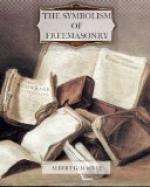XXVI.
The Legend of the Winding Stairs.
Before proceeding to the examination of those more important mythical legends which appropriately belong to the Master’s degree, it will not, I think, be unpleasing or uninstructive to consider the only one which is attached to the Fellow Craft’s degree—that, namely, which refers to the allegorical ascent of the Winding Stairs to the Middle Chamber, and the symbolic payment of the workmen’s wages.
Although the legend of the Winding Stairs forms an important tradition of Ancient Craft Masonry, the only allusion to it in Scripture is to be found in a single verse in the sixth chapter of the First Book of Kings, and is in these words: “The door for the middle chamber was in the right side of the house; and they went up with winding stairs into the middle chamber, and out of the middle into the third.” Out of this slender material has been constructed an allegory, which, if properly considered in its symbolical relations, will be found to be of surpassing beauty. But it is only as a symbol that we can regard this whole tradition; for the historical facts and the architectural details alike forbid us for a moment to suppose that the legend, as it is rehearsed in the second degree of Masonry, is anything more than a magnificent philosophical myth.
Let us inquire into the true design of this legend, and learn the lesson of symbolism which it is intended to teach.
In the investigation of the true meaning of every masonic symbol and allegory, we must be governed by the single principle that the whole design of Freemasonry as a speculative science is the investigation of divine truth. To this great object everything is subsidiary. The Mason is, from the moment of his initiation as an Entered Apprentice, to the time at which he receives the full fruition of masonic light, an investigator—a laborer in the quarry and the temple—whose reward is to be Truth. All the ceremonies and traditions of the order tend to this ultimate design. Is there light to be asked for? It is the intellectual light of wisdom and truth. Is there a word to be sought? That word is the symbol of truth. Is there a loss of something that had been promised? That loss is typical of the failure of man, in the infirmity of his nature, to discover divine truth. Is there a substitute to be appointed for that loss? It is an allegory which teaches us that in this world man can only approximate to the full conception of truth.




